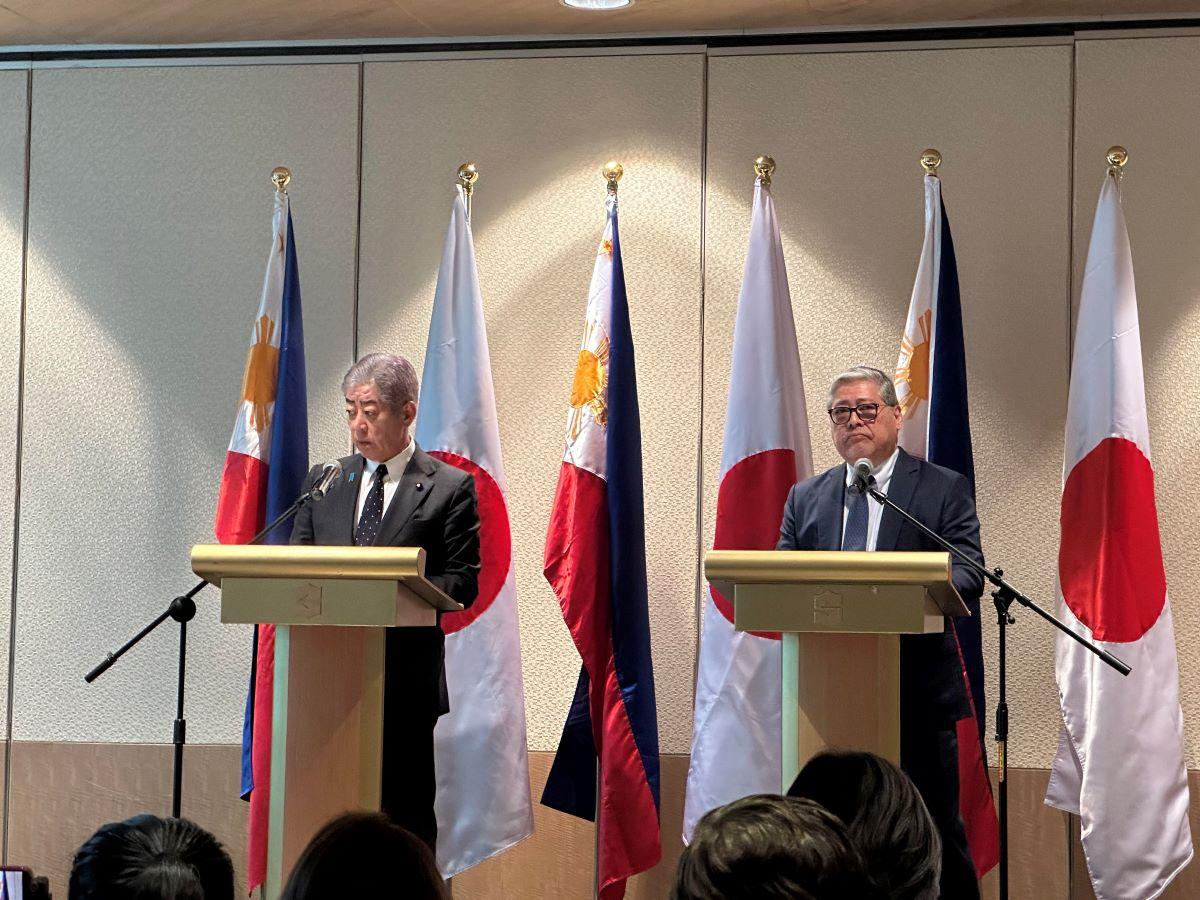Japan calls for easing of tensions amid China's actions in SCS

Japan on Wednesday called for a lowering of tensions amid China's actions in the South China Sea, which includes parts of the Philippines' exclusive economic zone.
Japanese Foreign Minister Takeshi Iwaya issued the statement during his meeting with his Filipino counterpart, Enrique Manalo, in Manila.
"Actions that escalate tensions in the South China Sea are a genuine concern for the international community because they are directly connected to regional peace and stability. Japan firmly opposes any efforts to unilaterally alter the status quo through force or to escalate tensions in the area, and we earnestly call for the reduction of tensions,'' Iwaya said.
In light of the ongoing situation in the South China Sea, Iwaya pledged to further enhance the partnership between Japan and the Philippines. He assured that Japan will keep supporting the Philippines in strengthening maritime security and enhancing maritime safety capabilities.
Manalo reiterated the steadfast commitment of both nations to uphold the rule of law and a rules-based framework in the South China Sea.
He highlighted the necessity of adhering to international law, particularly the 1982 United Nations Convention on the Law of the Sea (UNCLOS), and expressed a wish to work collaboratively with other like-minded countries.
Japan has expressed appreciation for the Philippines' peaceful efforts to assert its rights, as outlined in the 2016 Arbitral Ruling, which invalidated China's claims based on the "nine-dash line."
"Japan deeply values the stance of the Government of the Philippines for consistently adhering to the Arbitral Tribunal ruling regarding the dispute with China and for pursuing a peaceful resolution to this dilemma,'' Iwaya said.
Senior Philippine and Chinese diplomats will resume talks in China's southeastern city of Xiamen on Thursday as part of their Bilateral Consultation Mechanism.
“We don’t want to prejudge what the events or outcome will be, but what I can say is that they will, of course, be discussing the situation in the region, in the South China Sea and the West Philippine Sea, including the recent developments,'' Manalo said.
The Philippines will be represented by Manalo's deputy, Foreign Affairs Undersecretary for Policy Ma. Theresa Lazaro.
Both sides are likely to tackle the thorny territorial issues related to the West Philippine Sea and the South China Sea after a large Chinese Coast Guard vessel, called the monster ship, was spotted in the Philippine-claimed Scarborough Shoal (Bajo de Masinloc) and sailed close to the northwestern coast of Zambales early this week.
Manila filed a protest, demanding China withdraw its vessel immediately.
'Trilateral partnership'
Meanwhile, Iwaya said Japan and the Philippines should continue to strengthen its alliance with other like-minded nations, including the US, which, under the administration of outgoing President Joe Biden, sought closer ties with Tokyo and Manila through a “trilateral partnership.”
He called the three countries’ trilateral cooperation a “highly important framework” in “realizing a free and open Indo-Pacific based on rule of law” and vital to “maritime security, response to economic coercion, building resilient critical infrastructure and cyberspace.”
“Issue over the South China Sea is a legitimate concern for the international community because it directly links to the regional peace and stability,” he said.
Iwaya, who will be representing Japan to the inauguration of US President-elect Donald Trump next week, said he intends to raise with US officials America’s crucial role in the region.
With its strategic location and as an emerging world growth center, Iwaya said a “constructive commitment” by the US in Southeast Asia is important for peace and stability.
“This region is important also for the US itself,” he said, adding that both Manila and Tokyo have agreed to “maintain good communication with the next US administration and strengthen the momentum of our trilateral cooperation.”
Manalo said Japan and the Philippines are committed to pursuing trilateral partnership with the US.
He said this was reaffirmed during a video conference call by President Biden, President Ferdinand Marcos Jr. and Prime Minister Shigeru Ishiba early this week.
“This is an issue that we will continue to discuss with the US,” he said.
In recent years, Japan has played a bigger role in Asia, providing security assistance and defense equipment to the militaries of the Philippines and other selected Southeast Asian countries, and participated in freedom of navigation sails in South China Sea.
It also signed a key defense pact with Manila, called the Reciprocal Access Agreement (RAA) which allows both sides to train together in the Philippines and in Japan.
“Our strategic partnership with Japan plays an important role in our efforts to enhance our national security as well as regional peace and stability,” Manalo said. “We agreed to work together to enhance resilience and enhance adaptive capacity of our nations in this evolving geopolitical landscape in the Indo-Pacific region.” — with a report from Michaela del Callar/VBL, GMA Integrated News




